- Clone
- L3D10 (See other available formats)
- Regulatory Status
- RUO
- Other Names
- Cytotoxic T-Lymphocyte Antigen 4
- Isotype
- Mouse IgG1, κ
- Ave. Rating
- Submit a Review
- Product Citations
- publications
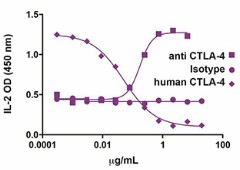
-
Anti-human CD152 (CTLA-4) inhibits production of IL-2 by Jurkat cells. When Jurkat cells are stimulated with PHA (2.5 µg/ml) and soluble CD80 (B7.1, 500 ng/ml), the addition of soluble human CTLA-4 competes with CD80 and inhibits the production of IL-2 in a dose dependent manner (diamonds). When a fixed concentration of CTLA-4 is selected and pre-incubated with increasing concentrations of anti-human CTLA-4 (clone L3D10), the production of IL-2 is restored as the antibody blocks the activity of CTLA-4, but not the isotype control (clone MOPC-21).
CD152, also known as Cytotoxic T-Lymphocyte Antigen 4 (CTLA-4), is a 33 kD member of the immunoglobulin superfamily. It is transiently expressed on activated T cells. CTLA4 is expressed on the surface of helper T cells and transmits an inhibitory signal to T cells. Regulatory T cells express high levels of CTLA-4. CTLA-4 (CD152) is similar to CD28 in amino acid sequence, structure, and genomic organization. Whereas CD28 delivers a costimulatory signal in T cell activation, CTLA-4 negatively regulates cell-mediated immune responses through interaction with CD80 (B7-1) and CD86 (B7-2) present on antigen presenting cells (APC). CTLA-4 is thought to play a role in the induction and maintenance of immunological tolerance as well as the development of protective immunity and thymocyte regulation.
Mutations in the CTLA-4 gene have been associated with various autoimmune diseases, such as systemic lupus erythematosus, insulin-dependent diabetes mellitus, and other autoimmune diseases. A transcript of the CTLA-4 gene that may represent a native soluble form of CTLA-4 (sCTLA-4) showed that eleven of twenty patients with autoimmune thyroid disease (ATD) had a high concentration of sCTLA-4, whereas only 1 of 30 apparently healthy volunteers contained measurable levels. sCTLA-4 immunoreactivity was inhibited by its binding to B7.1, suggesting that sCTLA-4 is a functional receptor. sCTLA4 also plays a role in the initial immune response to infection of immune cells by HIV, along with the CD-1 pathway and others.
Product Details
- Verified Reactivity
- Human
- Antibody Type
- Monoclonal
- Host Species
- Mouse
- Immunogen
- Extracellular domain of human CTLA-4 and human IgG1 Fc fusion protein
- Formulation
- 0.2 µm filtered in phosphate-buffered solution, pH 7.2, containing no preservative.
- Endotoxin Level
- Less than 1.0 EU/mg of the protein (< 0.1 pg/µg of the protein) as determined by the LAL test.
- Preparation
- The GoInVivo™ antibody was purified by affinity chromatography.
- Concentration
- The antibody is bottled at the concentration indicated on the vial, typically between 2 mg/mL and 3 mg/mL.
- Storage & Handling
- The antibody solution should be stored undiluted between 2°C and 8°C. This GoInVivo™ solution contains no preservative; handle under aseptic conditions.
- Application
-
ICFC - Quality tested
FC - Verified
Block - Reported in the literature, not verified in house - Recommended Usage
-
Each lot of this antibody is quality control tested by intracellular immunofluorescent staining with flow cytometric analysis. For flow cytometric staining, the suggested use of this reagent is ≤1.0 µg per million cells in 100 µL volume. It is recommended that the reagent be titrated for optimal performance for each application.
For in vivo and in vitro applications, we recommend to perform a pilot experiment to determine the optimal concentration to use for each particular experiment. - Application Notes
-
ELISA Detection: The biotinylated L3D10 antibody is useful as the detection antibody in a sandwich ELISA assay, when used in conjunction with the purified A3.6B10.G1 antibody (Cat. No. 525401) as the capture antibody and recombinant human CTLA-4 (Cat. No. 591909) as the standard.
Flow Cytometry: The fluorochrome-labeled L3D10 antibody is useful for immunofluorescent staining and flow cytometric analysis to identify CTLA-4-producing cells within mixed cell populations.
Note: For testing human soluble CTLA-4 in serum, plasma or cell culture supernatant, LEGEND MAX™ Human Soluble CTLA-4 ELISA Kit with Pre-coated Plates (Cat. No. 437407 & 437408) are specially developed and recommended.
Additional reported applications (for the relevant formats) include: Blocking of CTLA-4/B7-1 interaction and blocking of CTLA-4-mediated inhibitory function to promote T cell expansion1,2.
This clone has been tested in-house and determined to not be suitable for applications in immunohistochemistry of frozen or paraffin-embedded tissue sections (IHC-F or IHC-P). - Additional Product Notes
-
GoInVivo™ products are guaranteed to be pathogen-free based on the IDEXX BioResearch IMPACT test via PCR. For a full listing of pathogens tested, visit the GoInVivo™ Webpage.
- Application References
-
- May K, et al. 2005. Blood 105:1114. (Block)
- Lute K, et al. 2005. Blood 106:3127. (Block)
- RRID
-
AB_2566296 (BioLegend Cat. No. 349923)
AB_2566297 (BioLegend Cat. No. 349924)
AB_2566298 (BioLegend Cat. No. 349925)
AB_2566083 (BioLegend Cat. No. 349915)
AB_2566084 (BioLegend Cat. No. 349916)
AB_2566085 (BioLegend Cat. No. 349917)
Antigen Details
- Structure
- Ig superfamily, 33 kD
- Distribution
-
Activated T cells and B cells
- Function
- Negative regulator of T cell activation
- Interaction
- Antigen presenting cells, such as dendritic cells
- Ligand/Receptor
- B7-1 (CD80), B7-2 (CD86)
- Cell Type
- B cells, T cells, Tregs
- Biology Area
- Immunology, Inhibitory Molecules
- Molecular Family
- CD Molecules, Immune Checkpoint Receptors
- Antigen References
-
1. Barclay N, et al. The Leukocyte Antigen FactsBook. Academic Press Inc. San Diego.
2. Kuiper H, et al. 1995. J. Immunol. 155:1776.
3. Lindsten T, et al. 1993. J. Immunol. 151:3489.
4. Morton P, et al. 1996. J. Immunol. 156:1047. - Gene ID
- 1493 View all products for this Gene ID
- UniProt
- View information about CD152 on UniProt.org
Related FAQs
Other Formats
View All CD152 (CTLA-4) Reagents Request Custom Conjugation| Description | Clone | Applications |
|---|---|---|
| Purified anti-human CD152 (CTLA-4) | L3D10 | ICFC,FC,Block |
| PE anti-human CD152 (CTLA-4) | L3D10 | ICFC,FC |
| APC anti-human CD152 (CTLA-4) | L3D10 | ICFC,FC |
| Biotin anti-human CD152 (CTLA-4) | L3D10 | ELISA Detection |
| PE/Cyanine7 anti-human CD152 (CTLA-4) | L3D10 | ICFC,FC |
| GoInVivo™ Purified anti-human CD152 (CTLA-4) | L3D10 | ICFC,FC,Block |
| Alexa Fluor® 647 anti-human CD152 (CTLA-4) | L3D10 | ICFC,FC |
| PE/Dazzle™ 594 anti-human CD152 (CTLA-4) | L3D10 | ICFC,FC |
| PerCP/Cyanine5.5 anti-human CD152 (CTLA-4) | L3D10 | ICFC,FC |
| APC/Fire™ 750 anti-human CD152 (CTLA-4) | L3D10 | ICFC,FC |
| Ultra-LEAF™ Purified anti-human CD152 (CTLA-4) | L3D10 | ICFC,FC,Block |
| KIRAVIA Blue 520™ anti-human CD152 (CTLA-4) Antibody | L3D10 | ICFC,FC |
| Brilliant Violet 711™ anti-human CD152 (CTLA-4) | L3D10 | ICFC,FC |
| APC/Cyanine7 anti-human CD152 (CTLA-4) | L3D10 | ICFC,FC |
Customers Also Purchased
Compare Data Across All Formats
This data display is provided for general comparisons between formats.
Your actual data may vary due to variations in samples, target cells, instruments and their settings, staining conditions, and other factors.
If you need assistance with selecting the best format contact our expert technical support team.
-
Purified anti-human CD152 (CTLA-4)

PMA/Ionomycin-stimulated human peripheral blood lymphocytes ... -
PE anti-human CD152 (CTLA-4)

PMA/Ionomycin-stimulated human peripheral blood lymphocytes ... -
APC anti-human CD152 (CTLA-4)

PMA/Ionomycin-stimulated human peripheral blood lymphocytes ... -
Biotin anti-human CD152 (CTLA-4)
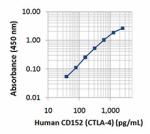
-
PE/Cyanine7 anti-human CD152 (CTLA-4)

PMA/Ionomycin-stimulated human peripheral blood lymphocytes ... -
GoInVivo™ Purified anti-human CD152 (CTLA-4)
Anti-human CD152 (CTLA-4) inhibits production of IL-2 by Jur... -
Alexa Fluor® 647 anti-human CD152 (CTLA-4)

PMA/Ionomycin-stimulated human peripheral blood lymphocytes ... -
PE/Dazzle™ 594 anti-human CD152 (CTLA-4)

PMA/Ionomycin-stimulated human peripheral blood lymphocytes ... -
PerCP/Cyanine5.5 anti-human CD152 (CTLA-4)

PMA/Ionomycin-stimulated human peripheral blood lymphocytes ... -
APC/Fire™ 750 anti-human CD152 (CTLA-4)

PMA/Ionomycin-stimulated human peripheral blood lymphocytes ... -
Ultra-LEAF™ Purified anti-human CD152 (CTLA-4)

PMA/Ionomycin-stimulated human peripheral blood lymphocytes ... -
KIRAVIA Blue 520™ anti-human CD152 (CTLA-4) Antibody

PMA/Ionomycin-stimulated human peripheral blood lymphocytes ... -
Brilliant Violet 711™ anti-human CD152 (CTLA-4)

Human peripheral blood mononuclear cells were stimulated wit... -
APC/Cyanine7 anti-human CD152 (CTLA-4)

Cell Activation Cocktail (without Brefeldin A) stimulated (4...
 Login / Register
Login / Register 









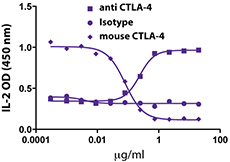
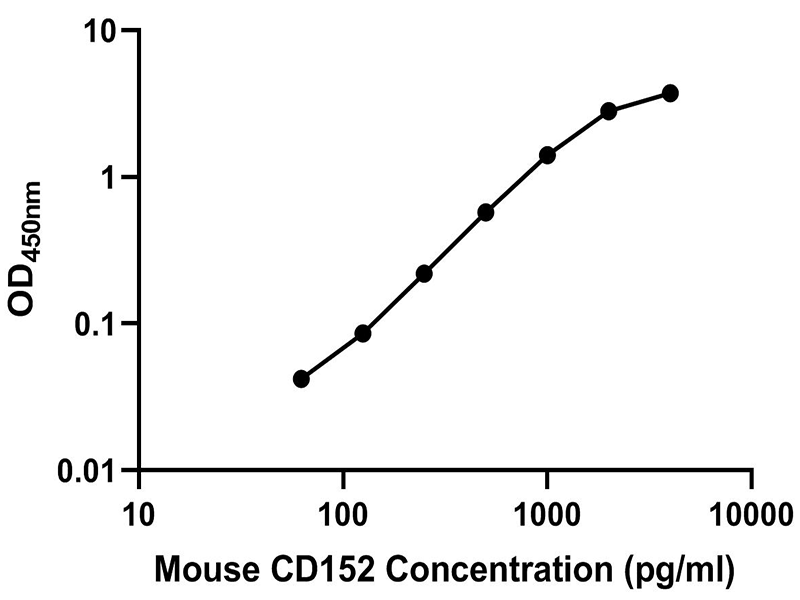
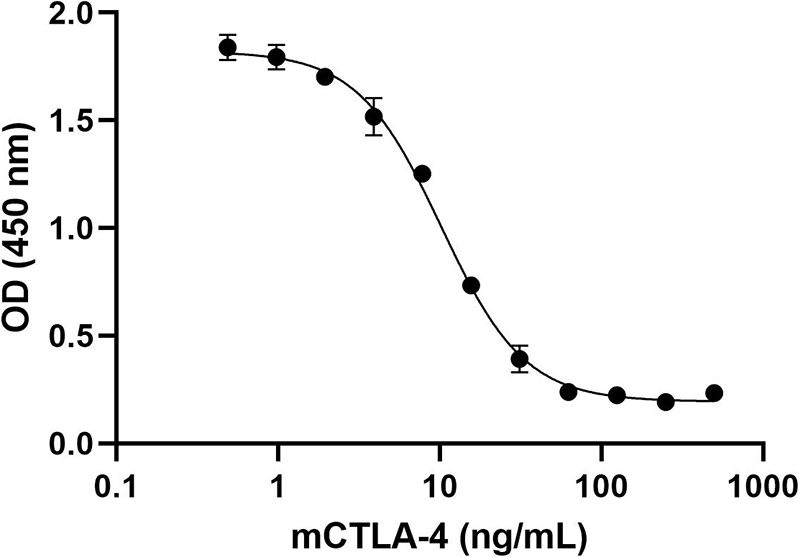
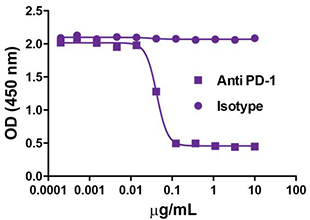
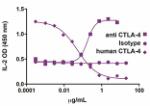



Follow Us